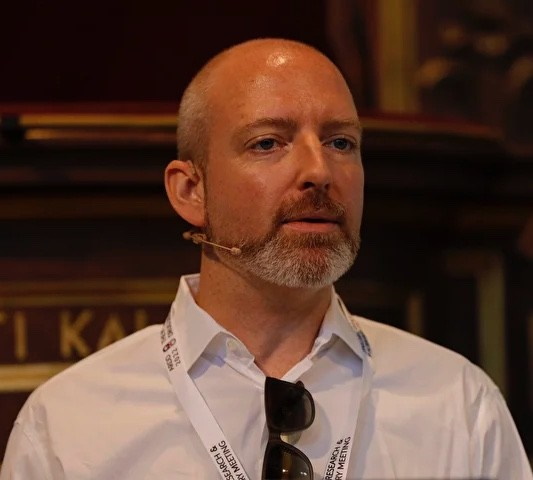Professor Björn Schumacher
Björn Schumacher, Ph.D. is Full Professor and Director of the Institute for Genome Stability in Aging and Disease at the CECAD Cluster of Excellence in Aging Research and the Center for Molecular Medicine Cologne (CMMC).
As a biologist interested in unrevealing the mechanisms of aging, Björn focuses on genome damage as a causal factor for the aging process. He has been full professor and director since 2013.
Björn has, together with his team of scientists in his lab, gained new insight into how the aging organism responds to the increasing damage to the genome of its cells. He is aiming to comprehensively explore the mechanisms of aging and derive future therapies that will allow the prevention of aging-associated diseases.
They have established the C. elegans system to investigate how DNA damage impacts tissue aging and how multicellular organisms respond to increasing levels of genome instability with aging. They have uncovered a novel function of the innate immune system to mediate systemic adjustments to tissue-specific DNA damage. They have also uncovered mechanisms through which longevity assurance pathways respond to DNA damage accumulation and antagonize the detrimental consequences of increasing levels of DNA damage with aging.
In addition, they are interested in understanding how germline genomes are maintained to allow the indefinite perpetuation of germ cells throughout the generation. Read Inheritance of paternal DNA damage by histone-mediated repair restriction.
Since 2012, Björn has been an Executive board member of the Excellence Cluster CECAD.
Since 2019, Björn has been Codirector at the Minerva Center of the Biological Mechanisms of Healthy Ageing at Bar-Ilan University. Together with the CECAD Cluster of Excellence at the University of Cologne, they generate a network of interactions and collaborations.
The network is based on routine discussions, student exchanges, and annual and international meetings. They also established connections to other aging centers including the National Institute of Aging at the NIH and the Glenn Laboratories for the Biological Mechanisms of Aging at the Albert Einstein College of Medicine. Together they create a global network with an international impact on the aging field.
In 2009, Björn became the Independent Junior Research Group Leader in the Cologne Excellence Cluster “Cellular Stress Responses in Aging-Associated Diseases” (CECAD), University of Cologne.
Björn is President of the German Society for DNA Repair (DGDR) since 2022 and was previously President of the German Society for Ageing Research (DGfA), between 2014 and 2020. He also serves on several editorial boards.
Björn, together with David Meyer, developed an “aging clock” that reads the biological age of an organism directly from its gene expression, the transcriptome. They described their so-called BiT age (binarized transcriptomic aging clock) in the article BiT age: A transcriptome based aging clock near the theoretical limit of accuracy in Aging Cell.
Björn earned his Ph.D. in Biology from the Max Planck Institute for Biochemistry, Munich, in 2004 and conducted his postdoctoral research as EMBO and Marie Curie fellow at the Erasmus Medical Centre in Rotterdam. He did his Ph.D. thesis work at Cold Spring Harbor Laboratory, New York in 2000. He earned his Master’s Degree of Science in Molecular Genetics and Microbiology in 1999 from Stony Brook University, and his Bachelor’s Degree of Science in Biology from the University of Konstanz in 1998.
Björn received the innovation prize of the State of Northrhine-Westphalia, the European Research Council (ERC) starting grant, and coordinated the FP7 Marie Curie initial training network on chronic DNA damage in aging (CodeAge) between 2012 and 2017..
He is the Author of The Mystery of Human Aging: Surprising Insights from a Science That’s Still Young, published in 2017. In his book, Björn shows what we can do to protect ourselves and what breakthroughs scientists are still working on, and he asks which industries benefit by peddling dubious information and dubious remedies. He also looks at why we are so keen to deny that we are aging when indeed, aging is a part of life — for everything from bacteria to humans.
Watch Genome Stability in Ageing and Disease: New Perspectives from C.elegans | Prof Bjoern Schumacher, Inspire Longevity interviews: Björn Schumacher and Ian Hickson, and Björn Schumacher – Genome Stability in Aging and Disease: New Perspectives from C. elegans.
Read David Meyer and Björn Schumacher developed BiT Age, a highly precise ‘clock’ for measuring biological age. Read Björn Schumacher to present at the 9th Aging Research & Drug Discovery Meeting 2022.
Read The p53 network: cellular and systemic DNA damage responses in cancer and aging. Read The Mystery of Human Aging: Why are we aging, what did we learn and where are we going?
Read his current Project Details at Gepris and his Curriculum Vitae at CMMC.
Visit his LinkedIn profile, his Work Homepage, his Google Scholar page, and his ResearchGate profile. Follow him on Facebook, Loop, ORCiD, and X.
